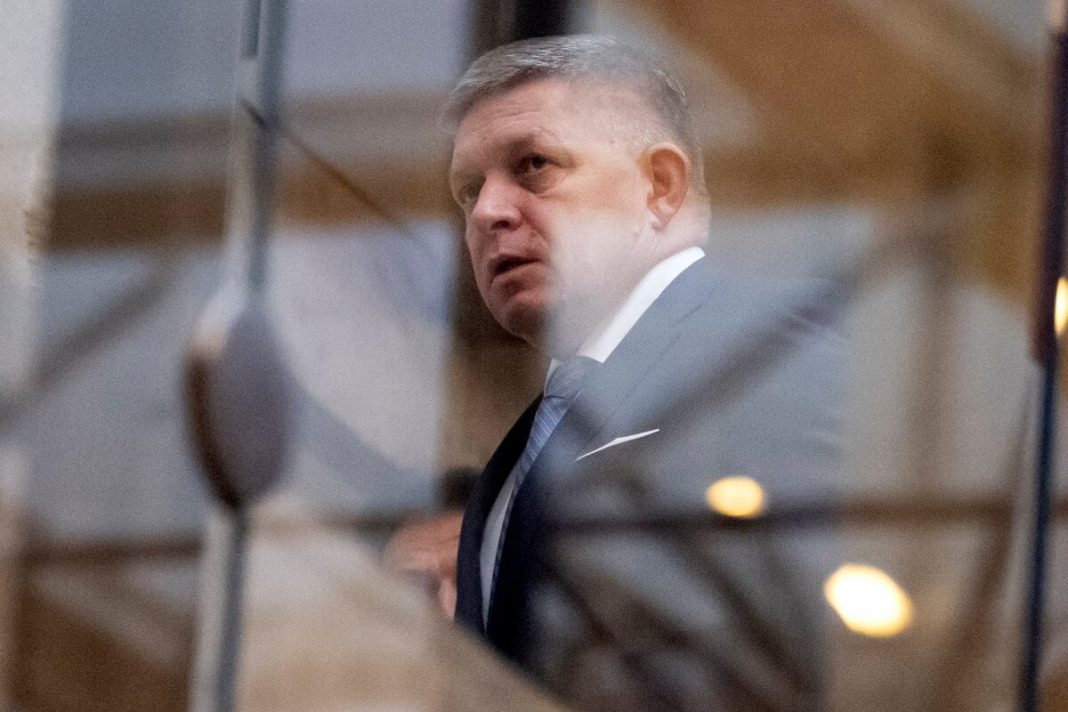On March 23, the first round of presidential elections will occur in Slovakia. Slovakia is a parliamentary republic and the role of the President is largely ceremonial. Presidents in this country do not have much executive power. Even the presidential veto on decisions of the Slovak parliament – the National Council – is easily overcome. To do this, you just need to vote on the bill again, approving it with a simple majority. However, despite its political limitations, the presidency has a particular set of tools that can “complicate” the life of the current coalition led by Prime Minister Robert Fico. One of these tools is personnel. According to his constitutional powers, the President nominates and appoints the prime minister, three constitutional court judges, and three judicial council members. Most importantly, he introduces the candidacy of the attorney general, which makes it difficult to gain complete control over the country, which Robert Fico clearly strives for. The 2024 presidential elections are a chance for liberal Slovakia so that the country does not follow the Hungarian path or turn away from the European and democratic path. This is extremely important today both for the European Union and for Ukraine, torn by the war with Russia.
In this paper, Ascolta analyses the internal political situation in Slovakia and also studies current trends on the eve of the presidential elections, which, despite the nominal position of the President, may have severe consequences for the formation of the country’s future foreign policy vector.
This Content Is Only For Subscribers
Zuzana Caputova is eliminated from the game.
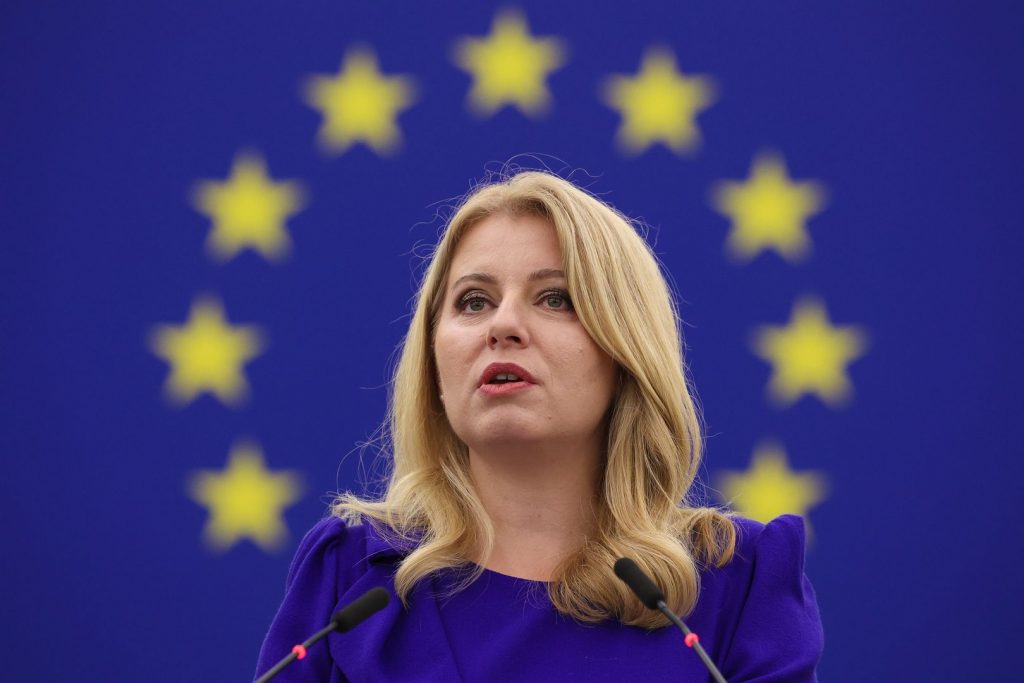
One of the features of the current presidential elections in Slovakia is the unexpected refusal of the fight for the second term of one of the country’s most popular politicians and the current head of state, Zuzana Caputova. Back in June 2023, on the eve of her 50th birthday, she said: “By my decision not to run, I do not abandon the ideals and belief in the values to which I have dedicated my professional and personal life. I tried to help democracy and justice in Slovakia before my presidential mandate, during it and will do so after.” She did not hide that her refusal to run resulted from powerful and dirty pressure on her and her family.
Behind all this, many experts say the “hand” of Robert Fico, who was Caputova’s main critic throughout the election campaign. In response to Fico’s assertion that she is a puppet of the United States and defends the interests of the American financier George Soros, Chaptuova filed a lawsuit against the then-opposition politician. Another ardent critic of Zuzana Caputova was Fico’s deputy in the party and now the deputy speaker of parliament, Lubosz Blaha. Back in 2022, the regional court in Bratislava upheld the verdict of a lower court that the National Council deputy from the opposition party (Smer-SD), Lubos Blaha, had slandered the President of the Slovak Republic. Then Blaha again “distinguished himself” – having become vice-speaker of parliament, he threw the European Union flag out of his office. He replaced the portrait of President Caputova with a picture of Che Guevara, calling his actions “autumn cleaning.”
The “relationship” between Caputova and Fico has a long history. Speaking as a presidential candidate from the extra-parliamentary Progressive Slovakia party, Zuzana Čaputová did not hold important positions, was not a member of parliament, but was involved in protecting the environment and the rights of women and sexual minorities. Her electoral weapon was the fight against corruption. The story of the murder of journalist Jan Kuciak greatly facilitated the rise of her popularity.
The 27-year-old journalist and his fiancee were shot dead on February 21, 2018, in their home 65 kilometres east of Bratislava. In the last material that Kuciak worked on before his death, he explored the connections of Slovak Prime Minister Robert Fico’s associates with Italian entrepreneurs, who, in turn, were connected with the mafia. Zuzana Čaputová herself participated in the mass protests against corruption that began after the murder of the journalist. As a result, Fico, his two assistants, the head of the Ministry of Internal Affairs, the chief of police, and the Minister of Culture, who formally supervised journalists in the country, resigned. Fico was replaced as Prime Minister by Peter Pellegrini, the current Speaker of the Slovak Parliament and today’s presidential candidate. In June 2019, Zuzana Čaputová became the first female president of Slovakia. After her victory in the presidential election, it was said that Caputova’s victory would show a different face of Central and Eastern Europe to illiberal forces and the centralisation of politics taking place in Hungary and Poland.
Ahead of early parliamentary elections in 2023, Caputova said she was concerned about the spread of disinformation in her country and that the upcoming parliamentary elections could weaken support for Kyiv.
Let us recall that since the beginning of Russia’s full-scale aggression against Ukraine, Slovakia sent Kyiv a squadron of MiG-29 fighters, an S-300 air defence system, Mi-17 helicopters, as well as Zuzana-2 self-propelled howitzers, which are a product of the Slovak military-industrial complex. The amount of military aid transferred to Ukraine from Bratislava amounted to €671 million. According to the European Union, more than 100 thousand Ukrainian citizens received temporary protection in Slovakia. The railway connection between Ukraine and the EU via Slovakia is also of considerable importance.
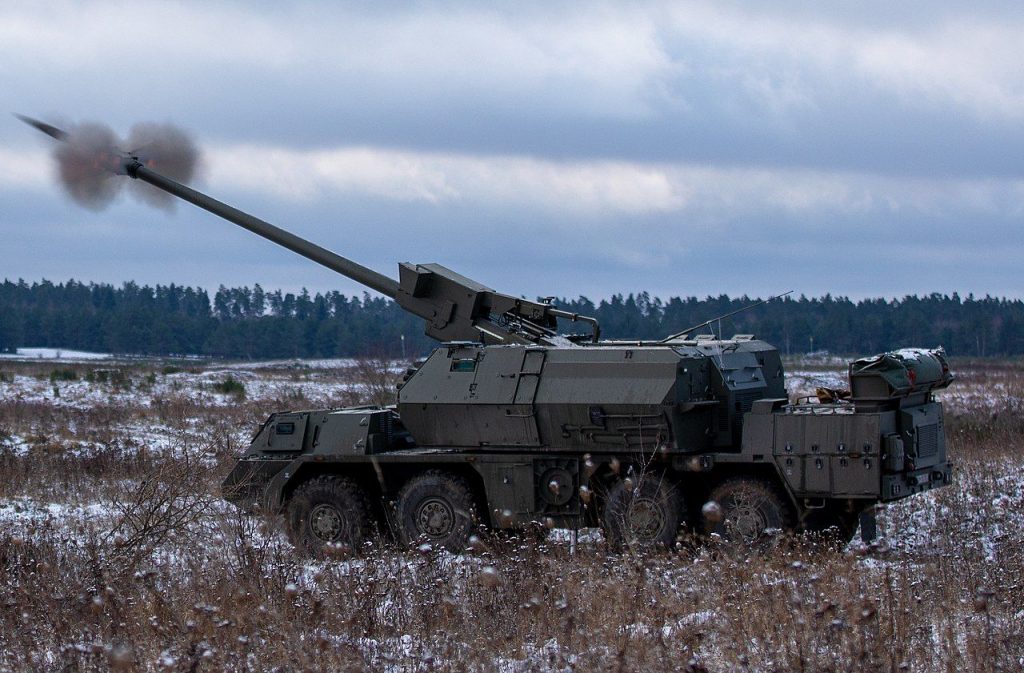
However, after Fico’s party won the parliamentary elections, Zuzana Caputova was criticised for announcing the suspension of military assistance to Ukraine during the formation of the new government. As the Slovak presidential administration explained, the decision to provide military assistance at this particular moment would create a precedent for future changes in political power.
Then, the “coalition” and the approval of the government began. Let us recall that the new government coalition was formed from the party of Robert Fico, who won the elections with a result of 23%, “Smer-SD” (“Course – Social Democracy”), the centre-left party “HLAS” (Voice) of Peter Pellegrini and the Slovak National Party of Andrej Danko (SNS ). The liberal Progressive Slovakia party, which came second in the election with 18% of the vote, ended up in opposition. Although they also offered Fico to create a coalition and head the government, he refused.
Another escalation between Caputova and Fico occurred during the government’s approval period. Then Fico said that President Caputova was deliberately delaying the appointment of a new government cabinet. Caputova blocked the government’s appointment because of Rudolf Gulyak’s candidacy for the Minister of Environment post. He showed hostility towards environmental activists, declared his intention to revoke the status of several national parks, and once quite seriously claimed that the bears breeding in the mountains of Slovakia were Brussels’ secret weapon aimed at destroying the way of life of the Slovak countryside. Gulyak is an outspoken pro-Kremlin politician; not long ago, he said that he would personally go to Moscow to ask for forgiveness for the sin of the past governments of Slovakia – supplying weapons to Ukraine. “This man is a pure disaster. He has nothing to do with nature conservation, except that in several of his statements, he fights against it,” says Slovak ecologist Erik Balazs.
Fico needed to form a government for the summit of the European Union leaders, and he reluctantly replaced him. The new candidate is Tomas Taraba, another far-right politician on the SNS list who entered parliament.
Following the government change, President Caputova approved a new composition of the Cabinet of Ministers, headed by Robert Fico. At the same time, there were rumours in Slovak political circles that Caputova had approved almost all the ministers from Fico’s government, even those against whom criminal investigations were underway, precisely because of threats from the future prime minister.
Despite everything, Slovak President Zuzana Caputova continues to criticise Prime Minister Robert Fico for the latter’s position on Ukraine, contacts with Russia and attempts to weaken the rule of law. In a recent interview with the Financial Times, she said Mr Fico was testing “the limits of democracy” with his actions.
Four times into one river
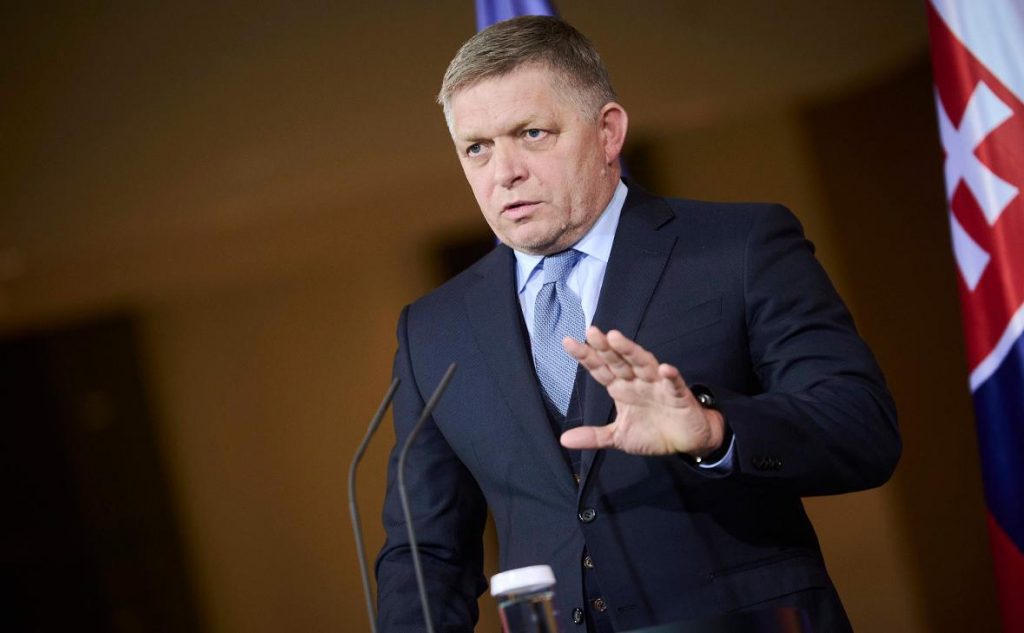
The ancient Greek dialectical philosopher Heraclitus once remarked: “You cannot step into the same river twice.” In the original, there’s no time like the present; that is, “there is no other moment like right now.” In a broad sense, this means it is necessary to seize the moment…
With all his actions in politics, Fico seemed to refute the famous philosopher: he entered the government “river” for the fourth time and constantly “seized the moment” to find himself at the top of the political Olympus again and again.
He first ascended to the political Olympus after the victory of his Smer party in the 2006 parliamentary elections. Having formed a government coalition, he replaced Mikulas Dzurinda as Prime Minister. According to Alexander Duleba, an expert at the Slovak Foreign Policy Society, the impetus for the country’s sustainable development was given by the reforms of the liberal Mikulas Dzurinda, who was prime minister from 1998 to 2006. Fico benefited from the work of his predecessor. “There was an economic boom, massive investments, and Fico came at a time when it was already possible to live, thanks to the work of the right forces. Fico began to pursue populist policies and lived with these reforms – when there is money, you can distribute it, increase pensions,” Duleba recalled.
During his “second coming” to power in 2012, Fico’s party received more than 43% of the votes; he did not need a coalition, and he received a one-party government. Many analysts are very reserved about Fico’s performance as Prime Minister of Slovakia. They consider Robert Fico’s policies to be left-wing and populist. The government he headed did not continue reforms, resulting in stagnation. Ill-conceived populist decisions had bad consequences not only for the economy but also for the financial stability of the country. The last of Robert Fico’s proposals submitted to the Slovak parliament was to give 500 euros to everyone who came to the polls.
Another disadvantage of Fico is that he is naturally extremely conflicted. He did not keep his word; he changed his position. His constant scandals between parties within the coalition were a constant subject for television viewers. In addition, there were reasons to suspect that members of Fico’s Cabinet had been dishonest in the past. “The court confirmed more than 40 cases in 2018-2019 when high-ranking officials were punished for corruption. And this is also the result of Fico’s rule,” said Slovak expert Alexander Duleba in comments to Voice of America. The end of his premiership was inglorious. Fico left the government in 2018 amid mass protests following the murder of journalist Jan Kuciak and his fiancee, which we have already discussed. At that moment, even his party stopped believing in Fico’s political future. His ally Peter Pellegrini, to whom Fico entrusted the prime minister’s seat after his forced resignation, formed his party “Voice” for the 2020 elections. And “Smer” lost those elections and went into opposition.
The Cabinet elected in 2020 began seriously investigating corruption. Over the past three years, many of Fico’s close associates—high-ranking officials, police officers and tax officials—have come under investigation. Charges were also brought against Fico, but he avoided trial due to parliamentary immunity. At the vote in the People’s Rada on the issue of depriving Fico of this protection, only two votes were missing. At the same time, Smer declared political motives for the persecution of its leader.
His fourth entry into Slovak politics took place in September 2023. The background for the past election campaign was the war, the economic and social problems it caused and the government leapfrog of the last few years in Slovakia. Since the 2020 elections, the ruling coalition has disintegrated and been reformed several times. As a result, early elections were announced in January 2023, and a “technical” government was appointed in May.
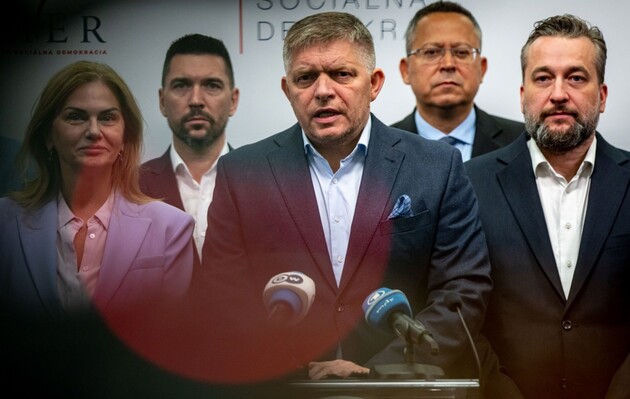
In Slovakia, these problems are directly associated with the country’s foreign policy – particularly with the war in Ukraine and, to a lesser extent, with European migration policy. Fatigue with political instability and disillusionment with government institutions also likely influenced Slovaks’ desire to support Robert Fico’s party in the elections. Fico built his campaign on “three pillars”. Smer promised to solve economic problems – to curb prices for electricity and food, which jumped from 1% to 4-5%, and to subsidise mortgages. Voters were highly impressed by this.
Secondly, Fico promised to at least distance himself from the war in Ukraine and, at maximum, achieve its end. According to polls conducted in Slovakia in the spring of 2023, only 40% of Slovaks believed that responsibility for the war in Ukraine primarily lay with Russia, while 34% blamed the West, which allegedly provoked the Kremlin. Another 17% believed that Ukraine was to blame, which, in their opinion, oppressed the Russian-speaking population.
Third, Fico’s announcement to restore “stability and order” was entirely in keeping with the electorate in a country with three prime ministers in four years. Thus, Fico reached the “protest” voters – people who did not like anti-COVID measures and then thought that political chaos reigned in the country. Now, this group believes that the Slovak government is paying too much attention to Ukraine. These people are easily frightened by Soros, sexual minorities and other slogans that Fico’s party actively used as a populist.
The secret of his success is that he voiced exactly those points that his voters wanted to hear. You can pay attention to how many votes were cast for Fico – almost 23% of the 68 per cent turnout. That is, in reality, less than 20 per cent of Slovak voters voted for him. This is a tiny audience. At the same time, on the eve of the elections, young people on social networks and the media discussed the issue of possible emigration if Fico wins – at least to the Czech Republic. The Washington Post wrote then that the politician “successfully rode the wave that raised populists across Europe.”
Fico’s political steps show inconsistency and a frank desire to sit “on two chairs.” This concerns Bratislava’s relations with Brussels, Kyiv and Moscow. Like his Hungarian colleague, Viktor Orban, he is trying to get some concessions that would benefit his government on other issues in exchange for support for a pan-European foreign policy. Fico tells his voters that he is against Ukraine in the EU and that Ukraine is not ready for membership. But in reality, it does not prevent Kyiv from passing through all the necessary stages on the path to EU membership. Just in return, Fico may demand that Brussels turn a blind eye to what he is going to do in Slovakia itself.
At one meeting with voters, he said that the war in Ukraine “began in 2014, when Ukrainian Nazis and fascists began killing Russians in the Donbas.” Because of such statements, many Western media began to call Fico a “pro-Russian politician.”
Although it is impossible to call Fico a pro-Russian politician, he is rather a populist. But unlike his Hungarian counterpart Viktor Orbán, a classic right-wing populist, few can say what kind of populist Fico is. He is simultaneously a rightist, a leftist, and a nationalist, forming a niche of populism in all ideological dimensions. In general, he is a complex figure who has masterfully emerged for the fourth time as Prime Minister of Slovakia, and it is unknown how much longer he will remain in politics.
Captured by contradictions

Widespread attention to the elections in Slovakia was attracted primarily due to Fico’s statements regarding the war in Ukraine. In particular, he promised that Bratislava would stop military assistance and Kyiv would no longer receive “a single bullet.” The “peaceful” agenda formed in the elections allowed Fico to attract votes from far-right parties. Voters once again “swallowed” Fico’s electoral “bait”. The fact is that his successful political career was built not based on values or ideology but on pure pragmatism. If Fico makes any statements, it means that, at the moment, it is beneficial for him. He only does what gets him political points.
To show his electorate that Fico was fulfilling his election promises, one of the first decisions the politician approved as head of government was stopping military supplies to Ukraine. At the beginning of November 2023, the Cabinet of Ministers decided to send no longer the Ukrainian Armed Forces equipment and ammunition located in state army warehouses. At the same time, Fico did not prohibit Slovak manufacturers of weapons and military equipment, including state-owned enterprises, from fulfilling commercial orders for the Ukrainian army. Slovak self-propelled guns, “Zuzana”, were ordered for Ukraine by the Germans, Norwegians, and Danes. Bratislava also plans to triple its ammunition production in 2024. His notorious pragmatism does not allow him to cut off cooperation with enterprises whose contracts are not paid from the Slovak budget but through commercial orders, from which taxes are also paid, and jobs are saved. Therefore, monitoring what the Slovak Prime Minister does is more important than what he says.
Another example of the “contradictions” of Fico’s policies appeared during his visit to Ukraine and meeting with his Ukrainian colleague Denis Shmygal.
On the eve of his trip to Uzhgorod, he appeared on Slovak Radio, where he called Ukraine a corrupt country where Western money is being stolen and Kyiv’s efforts to liberate the territories occupied by Russia unrealistic. The Slovak prime minister said the Russian invasion of Ukraine was a violation of international law but noted that the war must end with a compromise that would be “very painful for both sides.”
“What are Ukrainians waiting for? That the Russians will leave Donbas and Lugansk? Or that they will leave Crimea? This is unrealistic. The conflict cannot be resolved militarily, and prolonging it will only strengthen Russia’s position,” Fico said. To top it off, the head of the Slovak government announced that he would not support Ukraine’s membership in NATO. “I will block it and tell [Shmygal] that I am against her entry. Because Ukraine’s entry into NATO will become the basis for a third world war and nothing more,” he said. After such “revelations” by Fico, many experts believed that the meeting scheduled in Uzhgorod between Slovak Prime Minister Robert Fico and his Ukrainian counterpart Denis Shmygal would seem to finally formalise Bratislava’s withdrawal from the Western coalition providing military assistance to Kyiv. However, nothing of the kind happened.
In Uzhgorod, Robert Fico was replaced. Not a trace remained of the former belligerence. As if confirming that anti-Ukrainian rhetoric is aimed exclusively at a domestic audience, the Slovak prime minister in Transcarpathia did not criticise Ukraine. Moreover, he promised to support Kyiv in the process of European integration. He assured that Slovakia would not create any obstacles in the approval of 50 billion euros by the European Union to Ukraine. Fico also confirmed that Slovakia will continue cooperation with Ukraine in commercial supplies of military equipment. He also promised to provide Ukraine with two Bozena-4 mine-clearing vehicles as humanitarian aid and supply Ukraine with engineering equipment for constructing defence fortifications. And for the first time, the Slovak prime minister supported the “peace formula” proposed by Ukrainian President Vladimir Zelensky. However, he noted that he considered it unrealistic. “I don’t believe in a military solution to the conflict,” he explained, “Therefore, my government will support any peace plan.”
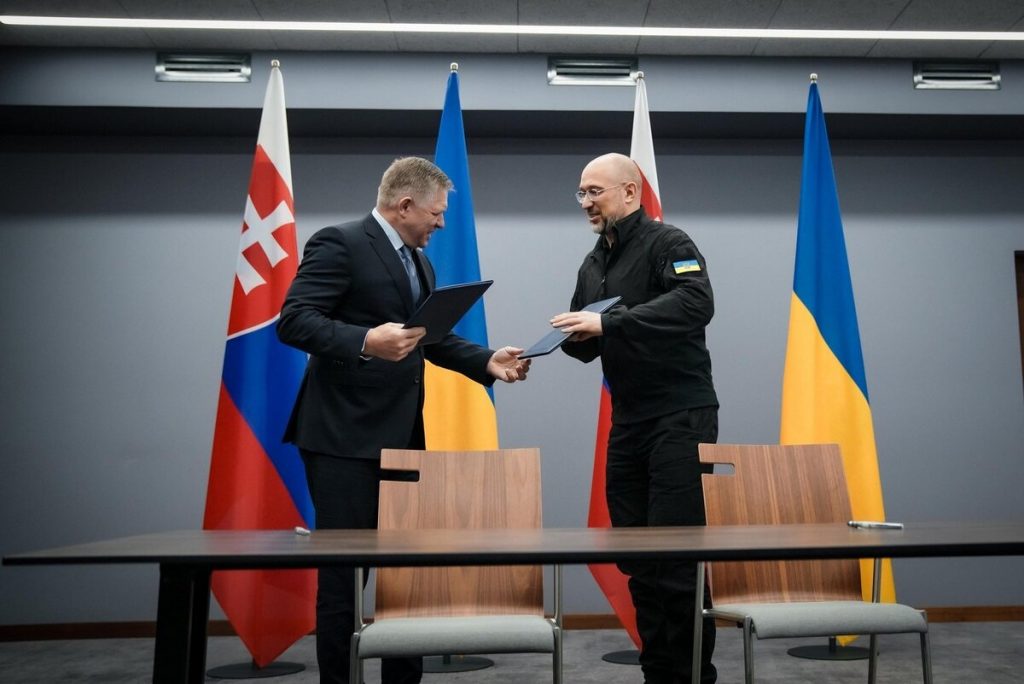
The greatest problems at the meeting were revealed not in politics but in the economic sphere. And first of all, this concerns Russian gas supplies to Slovakia. As you know, the contract between Gazprom and Naftogaz for the transit of Russian gas through the territory of Ukraine ends in 2024, and Kyiv does not intend to enter into new contracts with the Russian gas monopolist. However, as noted in the Cabinet of Ministers, Ukraine can talk about using its gas transportation system with an EU member state. Following the meeting, Fico enthusiastically noted that gas transit through Ukraine to Slovakia will continue.
Perhaps such a cunning move by Kyiv, which looks like a concession to Bratislava, will make Fico more dependent on Ukraine and negotiable in political matters. Another stumbling block in the economic relations of the two countries is the ban on the import of Ukrainian grain to Slovakia, which lasts from September 16, 2023. In Uzhgorod, this issue has not moved forward. As experts note, it directly affects the interests of agricultural producers in Slovakia. Fico, like his European colleagues, will not spoil relations with his farmers and create additional internal opposition for himself for the sake of Ukraine.
In addition, issues of cross-border infrastructure development were raised at the meeting. And here, there were no disagreements. The prime ministers agreed to speed up the reconstruction of the Mukachevo – Velke Kapušany interconnector. This will connect national power grids to improve interaction in the energy sector and make the energy system more resilient to blackouts and other emergencies. The parties also discussed issues of improving the logistics and transport infrastructure between Slovakia and Ukraine, raised the issue of creating new border crossings and potential joint efforts to create a railway connection between Kyiv and Kosice using broad-gauge infrastructure from Uzhgorod station through Slovakia. Following the meeting, many experts noted that by and large, it is not economically profitable for Fico to make an enemy out of Ukraine. There are not so many benefits from close cooperation with Moscow at the expense of relations with Europe and Ukraine.
Foreign policy zigzags
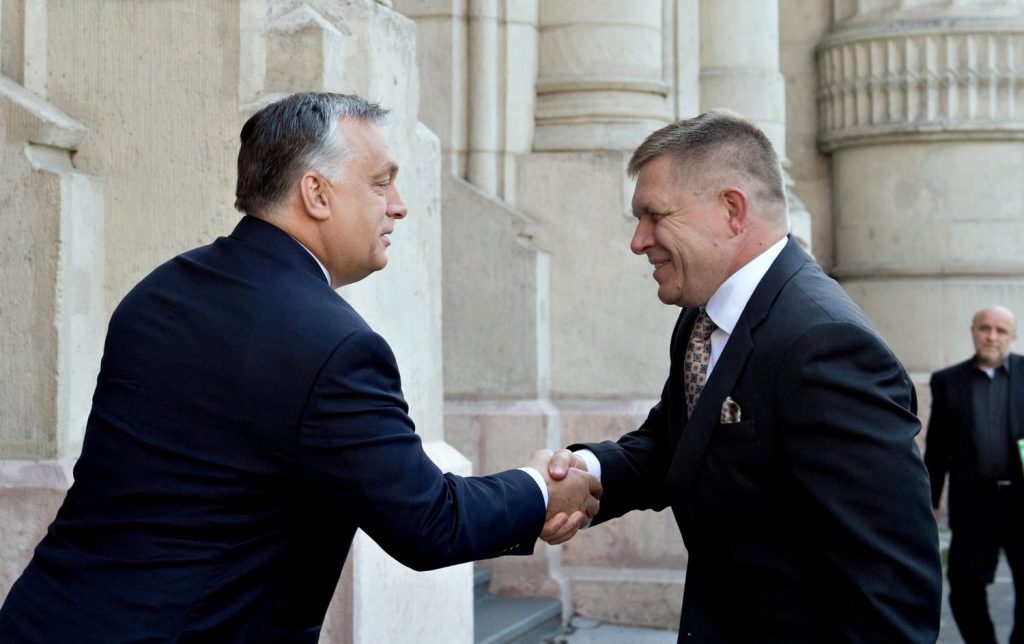
Even during the election campaign, Fico stated that the European Union had turned into a puppet in the hands of the United States and was interfering more than necessary in the internal affairs of Slovakia. He accused the Bratislava authorities of colluding with George Soros and promised to pay more attention to problems within the country, as well as the fight against illegal migration – in particular; he said that he would restore control on the border with Hungary. The EU was particularly sensitive to Fico’s statements in the style of “…Ukraine will not receive a single bullet,” which related to the cessation of military assistance to Kyiv and the pro-Russian rhetoric of the future prime minister.
After winning the September elections, experts and European politicians seriously feared that Fico would ally with Hungarian Prime Minister Viktor Orban to jointly oppose Brussels. At times, the escalation became hyperbolic: “Orbán and Fico will begin to change their foreign policy orientation and will actually begin to withdraw Slovakia from European structures and the NATO structure.” Although not everyone in Europe shared such concerns, believing that Slovakia, with a population of 5 million, is too small to seriously influence the formation of EU policy and that the power of its leader is much more fragile than Orban’s power in Hungary. “Slovakia is such an insignificant country that this will hardly change anything. Bratislava has virtually no leverage. They need EU funds and goodwill, they really cannot afford to be troublemakers in Brussels,” one European diplomat undiplomatically told Politico on condition of anonymity.
Naturally, Fico is not going to go anywhere. His party’s program states in bold letters that they feel part of the Euro-Atlantic space and are in no way talking about leaving the EU, NATO, and Western society. Europe is the “living environment” of Slovakia. In his previous three terms as the head of government, the leader of Smer-SD successfully combined criticism of the EU, aimed primarily at a domestic audience, and constructive cooperation at the European level. Fico’s double standards concerning the EU are confirmed by the Holos party, stating that the key condition for its participation in the coalition with Smer-SD is the preservation of the country’s pro-European policy. And being a pragmatist, Fico understands perfectly well: Slovakia is very closely integrated into the European economy and needs the funds it receives from the EU for the development of infrastructure and economic and social reforms. This, and not loud pro-Russian rhetoric, will help him fulfil the stability and prosperity he promised his voters.
Therefore, the government of Robert Fico is trying to maintain pragmatic relations with Brussels, although from time to time it sharpens the rhetoric to work for the domestic audience. Thus, Slovakia’s position in the EU voting did not change significantly. At meetings with European leaders, Fico practically supports all decisions of the EU Council – even if he previously publicly expressed the opposite opinion.
On the eve of the October Council summit, the Slovak Prime Minister called on the European Union to “change the role of arms supplier to the role of peacemaker,” and following the meeting, together with the heads of other states, he voted for continued military support for Ukraine as long as it is necessary. He also supported Brussels’ position on starting negotiations on Ukraine’s accession to the EU. Unlike Orban, Fico did not block a new round of European assistance to Ukraine. Although earlier the Slovak prime minister supported the position of Hungary, which opposed the allocation of 50 billion euros to Ukraine in aid from the EU fund. At a joint press conference with Hungarian Prime Minister Viktor Orbán, Fico said that “in three years, we will also stand here and state that 50 billion euros have disappeared and that there are 100 thousand more dead soldiers on each side [of the conflict].”
The frequent change of position of the Slovak leader seems to illustrate the words of one of the diplomats that, unlike Viktor Orban, Robert Fico will not mainly “fight off European hands.” However, after Fico came to power, the world and European media wrote about such an alliance as a done deal, and Fico himself was called the second Orban. In congratulating Fico’s election victory, the Hungarian Prime Minister wrote on the social network “X”: “Guess who’s back! Congratulations to Robert Fico on his undisputed victory in the parliamentary elections in Slovakia. It’s always a pleasure to work with a patriot. Looking forward to it!”
However, over time, there was less and less faith in a stable political alliance between Hungary and Slovakia. Firstly, Fico’s party received in the last elections, although a relative majority, still only 24% of the votes. With this configuration of the party system, it will be challenging for Fico to concentrate power in his hands to the same extent as Orban did in Hungary. It was especially considering that Slovakia had a liberal democratic regime all this time. Secondly, Fico is economically more vulnerable and dependent on the EU, and a coalition with Orban can only complicate the flow of finance from Brussels to Bratislava.
Today, the actions of Orban and Fico in the European Union are not very synchronised, and sometimes they are simply contradictory. The Slovak prime minister behaves with his Hungarian colleague as if he were his voter. He says what Orban wants to hear but does what suits him. Another negative signal for the Hungarian Prime Minister was that Fico assured everyone in Brussels that he would not copy the “trolling” towards Western partners in the spirit of Orban, which he demonstrated when meeting with Russian President Vladimir Putin. Therefore, European people are discussing a political solid alliance between countries with less and less enthusiasm. And Orban seems to have lost faith in Fico as a reliable ally in the fight against the European Union, having gone “overseas” to look for him in Florida, where the famous “Eurosceptic” and possible winner of the US presidential election, Donald Trump, lives.
Anti-Americanism and Putinism
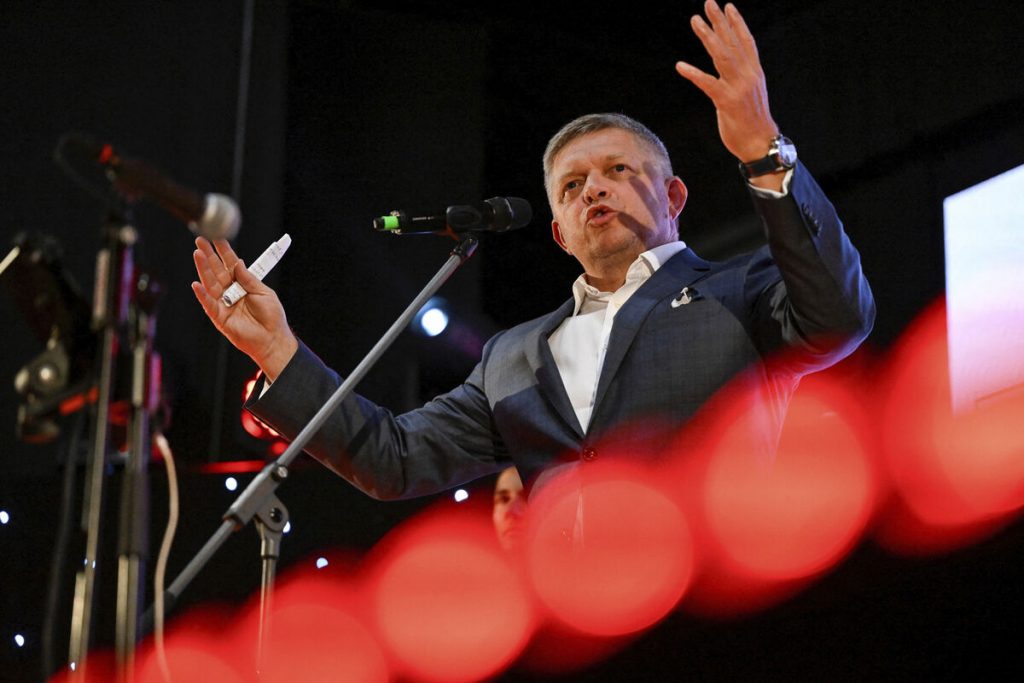
As for the relations between Bratislava and Washington are in many ways reminiscent of a “roller coaster”. And here Robert Fico demonstrates work on “two fronts” – internal and external. During his election campaign, he continually reinforced his anti-American rhetoric with stories about the critical influence of the United States on the European Union and Slovakia. This attracted the voices of the Slovak far right, residents of small towns and villages, where anti-American sentiment is more robust than pro-Russian sentiment. Then, after he was elected prime minister, probably still in the euphoria of his election victory, Fico, in a meeting with the US ambassador to Slovakia, Gautam Rana, announced that Bratislava would renegotiate the defence cooperation agreement with the US, concluded in February 2022.
In his interview with RTVS, Prime Minister Fico said: “Our agreement does not leave us any sovereignty. If there is some kind of American convoy, then no one can stop it, no one knows what they are carrying, we cannot ask what they are carrying in their cars.” According to him, the Slovak side is preparing proposals for discussion designed to eliminate all ambiguities and not leave open questions. However, at a meeting with congressmen and senators who arrived in Slovakia, Fico assured them there was no reason for unrest in Washington: Bratislava remains a reliable partner of NATO and the EU: “Nothing changes in this regard. We will act as a constructive partner and ally, but with a greater emphasis on Slovakia’s national interests.”
For Fico’s position on refusing military support to Ukraine, his reluctance to impose sanctions against Russia, as well as statements that the West is using Ukraine, he was dubbed a pro-Russian politician. However, not everything is so simple here, either. About the Russian Federation, Robert Fico demonstrates the same foreign policy zigzags that allow him to attract votes in elections, “knock out” financial preferences from the European Union and strengthen his power within Slovakia. Concerning the Kremlin, he has red lines that he cannot cross. If Viktor Orban can afford to meet with Putin, Fico will most likely not do this for fear of complicating the already difficult relations with the European Union. Does he have such a desire? Surely yes. Suffice it to remember that during his previous premiership, after the annexation of Crimea by Russia, when Putin fell into isolation, Fico was the only European politician of this rank who went to Moscow and was present there at the military parade. Many experts believe that Fico’s pro-Russianism is rooted in his past.
They say that according to his original convictions, Fico is a communist with great sympathies for the USSR. According to his classmates and fellow students, he was always distinguished by his love for the Soviet Union. He even tried to buy only Soviet things. He began his career working in a small research institute of the Ministry of Justice of the Slovak Socialist Republic and was essentially part of the party nomenklatura. After the collapse of the USSR, Fico often said that the regime in Slovakia before the Velvet Revolution of 1989 was more socially just.
Fico transfers his nostalgia for the Soviet Union and the communist past into politics, using it to mobilise part of the electorate.
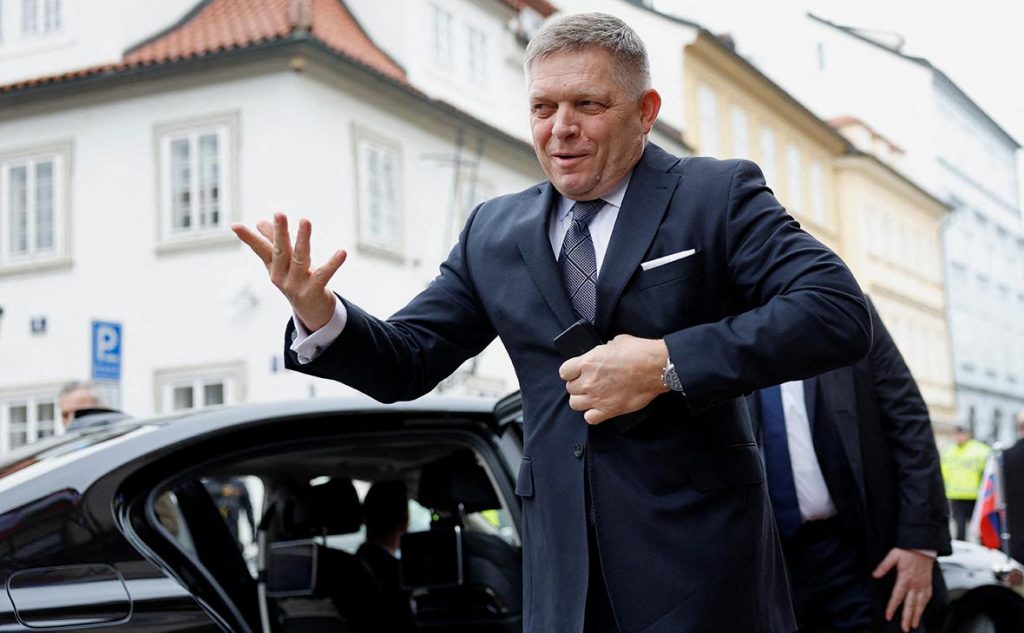
It is no secret that Slovakia is one of the most pro-Russian countries in Central Europe. Among some of the population here, bizarrely, both 19th-century Slavophilism and nostalgia for the communist regime live on. To preserve their identity and in search of creating their state, the Slovaks themselves “invented” a story about the “brotherly” Russian people. In the Russian Empire, they saw the source of salvation for the Slavic peoples from oppression by the Turks, Austrians and especially the Hungarians. Then, the Soviet period left its mark. Even the invasion of Czechoslovakia by Soviet troops in 1968 did not change the attitude of the Slovaks towards the “brotherly people”.
The suppression of the Prague Spring also did not make such a negative impression on the Slovaks as it did on the Czechs. Moreover, during these events, Slovak nationalists were appointed to important government positions in Czechoslovakia. For example, Gustav Husak became Secretary General of the Communist Party of Czechoslovakia in 1968. In Moscow’s eyes, the Slovaks demonstrated loyalty to it during turbulent events, which means they deserved a reward.
The older generation remembers with warmth the Soviet period when the healthcare and education systems improved, and industrialisation took place. This all still lives on, as does the pan-Slavic narrative about the importance of cooperation with countries that are culturally and linguistically close – that is, with Russia. Therefore, people who have come to power today and profess pro-Russian views know that the population has a demand for such rhetoric. These processes support each other. Fico’s current sympathy for today’s Russia is fueled to a greater extent by the fact that he is still an authoritarian leader. The Putin regime is closer to him in spirit and practice than liberal democracy.
Economic relations between the two countries have little macroeconomic significance. Thus, Russian imports to Slovakia in 2022 amounted to only 7.5%, most of which were energy resources. Today, the European Union, not the Slovak government, determines economic relations with Moscow. The “sweet pill” for the Slovak economy was the EU decision to extend the exemption from sanctions against the Russian Federation, thanks to which Slovakia will continue to use oil from Russia in 2024. The country’s Minister of Economy, Denisa Sakova, wrote on Instagram: “Good news regarding the energy sector. We received an exception to import Russian oil in 2024. For the republic, this means maintaining stable employment at the Slovnaft oil refinery and higher tax revenues.” In addition, she emphasised that the continuation of oil supplies also meant assistance to the neighbouring Czech Republic, which was facing a shortage of oil products.
Poland, the Czech Republic, and Hungary are much more significant partners for Slovakia, not to mention Germany, whose imports to Slovakia are at the level of 14.1% and amount to more than 16 billion euros, and Slovakia’s exports to this country amount to 22% in monetary terms, or more than 20 billion euros. As they say, comments are unnecessary.
However, suppose Fico advocates regular economic cooperation with Russia and often says that anti-Russian economic sanctions undermine the economy of Slovakia. In that case, it cannot be ruled out that there is also some benefit behind such rhetoric. As the famous Slovak political scientist – president of the Institute of Public Problems of Bratislava – Grigory Mesezhnikov noted: “Fico’s pragmatism is when the heart beats in the direction of Moscow, but the mind understands that the country is a member of the European Union.” As a result, his decisions on the Russian issue will be made situationally. Depending on how his relations with Brussels and Budapest develop, he will either blackmail the EU with pro-Russian statements or silently support the pan-European policy of isolating the Kremlin.
A bad year and reforms of discord
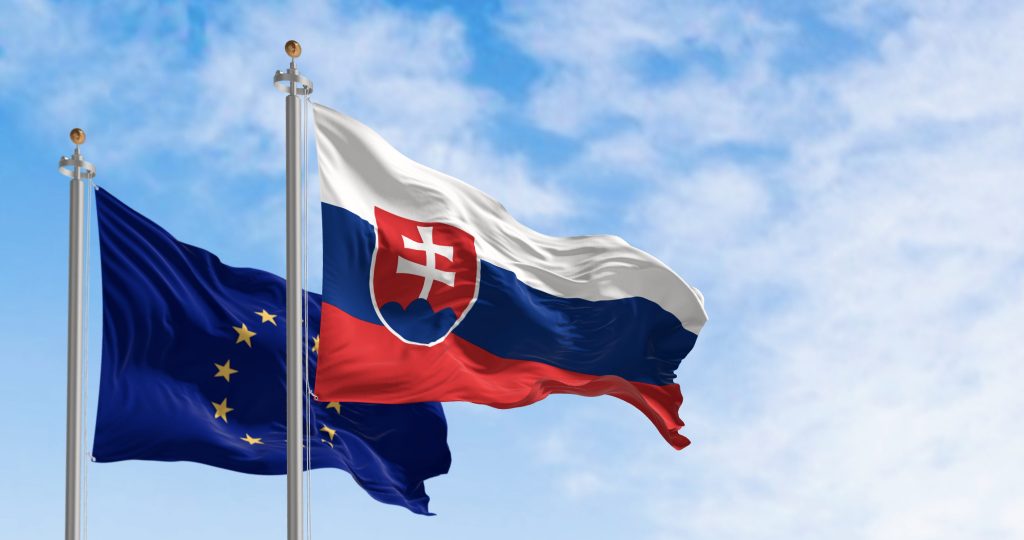
2024 will not be easy for Slovakia. Robert Fico will have more worries about domestic policy than about foreign policy.
First, the European Commission gives Bratislava a bleak forecast for the next two years, noting that Slovakia will have the most significant budget deficit in the EU, at approximately 7%. This is a massive number for the country. And since the country is a member of the European Union, its National Bank cannot carry out currency manipulations that could cover the budget deficit. According to the European Commission, the deficit will remain high even if the government does not continue emergency energy price subsidies.
Back in 2022, the government of Slovakia and national electricity-producing companies agreed to fix electricity tariffs for the population for three years – from 2022 to 2024. If this agreement had not been reached, the final price of electricity for the population of Slovakia would have increased by approximately 80% at current exchange prices. Each household will now be able to save €500 on average in 2023 and 2024. It should be about 1 billion euros, including value-added tax. According to the European Commission, new social spending will not stabilise the situation – so to speak, the price for government populism. The republic’s economy is also hampered by weak domestic consumption, which is affected by a drop in real wages due to inflation. Budget deficits or budget cuts can lead to increased social tension. And today there are no clear answers to these challenges from the government.
Secondly, the European Union is highly concerned about the reform of the criminal code carried out by the Fico government, which its critics consider a threat to the rule of law in the country. The amendments propose to soften penalties for financial crimes, including corruption and misuse of funds from the EU fund, and abolish the special prosecutor’s office to combat government crimes. The parliamentary opposition opposes the reform – the liberal parties Progressive Slovakia and Freedom and Solidarity and the conservative Christian Democratic Movement. Since the end of last year, their leaders have organised protests of thousands of people across the country every week. According to the opposition, Robert Fico is thus trying to prevent an investigation into allegations of corruption during his party’s last time in power. The opposition was also supported by the European Union, which warned Fico that it could block funding for Slovakia due to a violation of the rule of law, similar to Poland and Hungary. The European Public Prosecutor’s Office concluded: “…the proposed amendments… pose a serious risk of violating the rule of law” and call into question “the intention of the Slovak government to fulfil its responsibilities to protect the EU budget effectively.”
After parliament approved the reform bill in February, President Zuzana Čaputová appealed to the Constitutional Court, which suspended some draft provisions. Robert Fico called for the resignation of the chairman of the court due to leaks to the media about his decision on reform. The president called the intimidation “completely unacceptable and irresponsible.” As a result, Robert Fico’s government was forced to backtrack on its initial controversial proposals for reform of the Criminal Code.
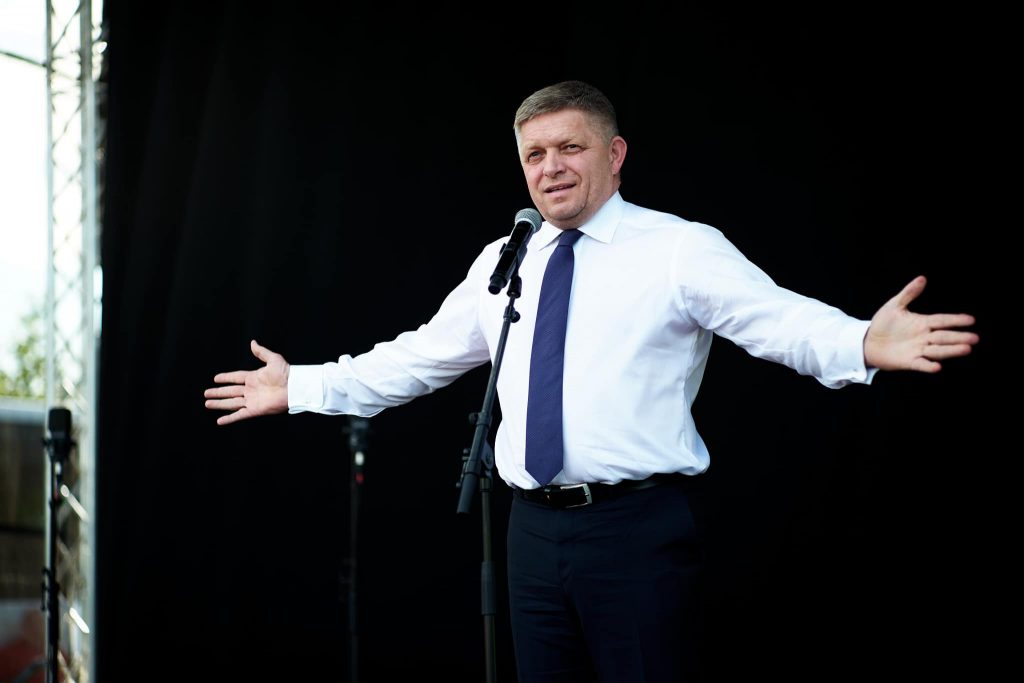
Another headache for Fico is the media. The Slovak press notes that his words added an aggressive tone towards independent media. Fico feels confident only when he debates with those who do not ask him tough questions, and most media in Slovakia are critical of him. Fico can make their life difficult: he can propose to ban government agencies and enterprises from buying advertising from them, or he can refuse to answer their requests and provide information, effectively establishing an information blockade with members of his government and party. The introduction of the status of a foreign agent in Slovakia on the Russian and Hungarian model is also being discussed. Fico proposed such amendments several years ago but did not have time to implement them. Focusing on political revenge, Slovakia is conducting purges of law enforcement agencies, especially those investigating crimes committed during Fico’s previous premiership.
The country is becoming increasingly polarised. Fico’s government regularly faces opposition protests against its policies. If earlier, they passed against the revision of the criminal code. On March 12, 2024, the first action against the foreign policy of the Slovak Prime Minister took place in Bratislava. The protesters expressed their support for Ukraine and condemned the actions of their government to restore ties with the Russian Federation. In January, the Minister of Culture of Slovakia, Martina Simkovíkova, spoke to restore cultural relations with Russia. In early March, Slovak Foreign Minister Juraj Blanar held talks with Russian Foreign Minister Sergei Lavrov on the sidelines of a diplomatic forum in Turkey. It was one of the few high-level meetings between a European Union member state and a country that the EU is trying to isolate.
The change in foreign policy has upset some of Slovakia’s allies. As a sign of protest, the Czech government suspended joint meetings with the Slovak government for the near future, which had previously been regular. As we see, the pressure on Fico is growing and his position is becoming more and more vulnerable. Mass discontent also facilitated this, which resulted in thousands of protests and the situation in parliament, where the ruling coalition had a majority with only a minimal margin. Therefore, Fico needs to cement his power and see him in the support of his coalition comrade, the leader of the Voice party and the Speaker of Parliament, Peter Pellegrini, in the upcoming presidential elections on March 23, 2024.
A Pellegrini victory would allow Fico to consolidate power in one hand like Orbán. According to the current legislation of Slovakia, in the event of victory, Pellegrini is obliged to resign as head of the party. Having lost his party’s support, it will be difficult for him to come into conflict with the government, and he will become more accommodating. Moreover, in this situation, the “Voice” party will come under the complete control of Fico. The Chairman of the Democratic Party, Jaroslav Nagy, said Prime Minister Robert Fico wants to control all government institutions through leader Peter Pellegrini. According to him, Pellegrini, as a possible president, will act “solely on the instructions of the current Prime Minister.”
Who will win?
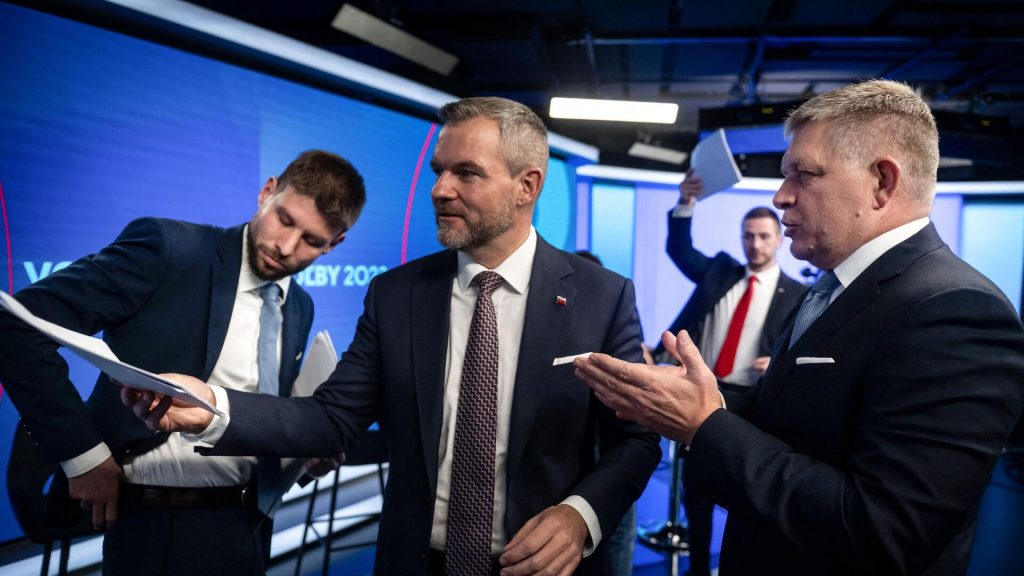
There are only a few days left before the presidential elections in Slovakia. As we noted above, the main surprise of this campaign was the refusal of the incumbent president and popular politician, Zuzana Caputova, to run for a new term. Today’s main favourites of the presidential race, capable of reaching the second round of elections, are the Speaker of Parliament, Peter Pellegrini and the former Minister of Foreign Affairs of Slovakia, Ivan Korcok.
“My vision is a proud and confident Slovakia, which is a strong part of the democratic world but always protects the interests of its nation-state first and foremost. I want to focus on these topics during the election campaign,” said Peter Pellegrini while presenting his election program. The candidate’s foreign policy vision speaks of the priority of the European vector. Peter Pellegrini ensured that Slovakia would remain a vital part of the European Union and the North Atlantic Alliance. Pellegrini had repeatedly emphasised his commitment to the European and Euro-Atlantic vector. One of the conditions for his party “Voice” to enter a coalition with Smer-SD was preserving the country’s pro-European policy.
However, there were also “undercurrents” that led the Speaker of Parliament into the arms of Fico. At one time, Peter Pellegrini created his party when he realised that Fico was too toxic, and some of his voters did not want to vote for him anymore. However, Pellegrini became prime minister in 2018 precisely through the Smer-SD quota. And despite all his “pro-Europeanism” in words and deeds on fundamental issues, even those that caused sharp criticism of the EU, Pellegrini tries to refrain from criticising Fico. Therefore, the critical argument that Fico used to draw Pellegrini into the coalition was, on the one hand, generous personnel “gifts” and, on the other hand, the threat of a split in the “Voice” party. Many people from Smer-SD are still in its ranks on whom Fico has influence. As a result, Pellegrini, having agreed then, agreed and has now become a presidential candidate from Fico’s coalition. He has excellent starting positions, a good rating, and is perceived by both pro-Western voters and Fico’s voters.
In turn, non-partisan Ivan Korchok represents the interests of liberal forces. Representatives of the democratic bloc call him a sensible conservative with a pro-Western political orientation. The candidacy of self-nominated Korczok was supported by the left-liberal party Progressive Slovakia and the liberal Freedom and Solidarity (SaS), and after some deliberation, right-wing conservatives from the Christian Democratic Movement (they did not hide that the ex-minister was too liberal for them, but still agreed, guided by the fact that the desire to stop Fico is more critical today).
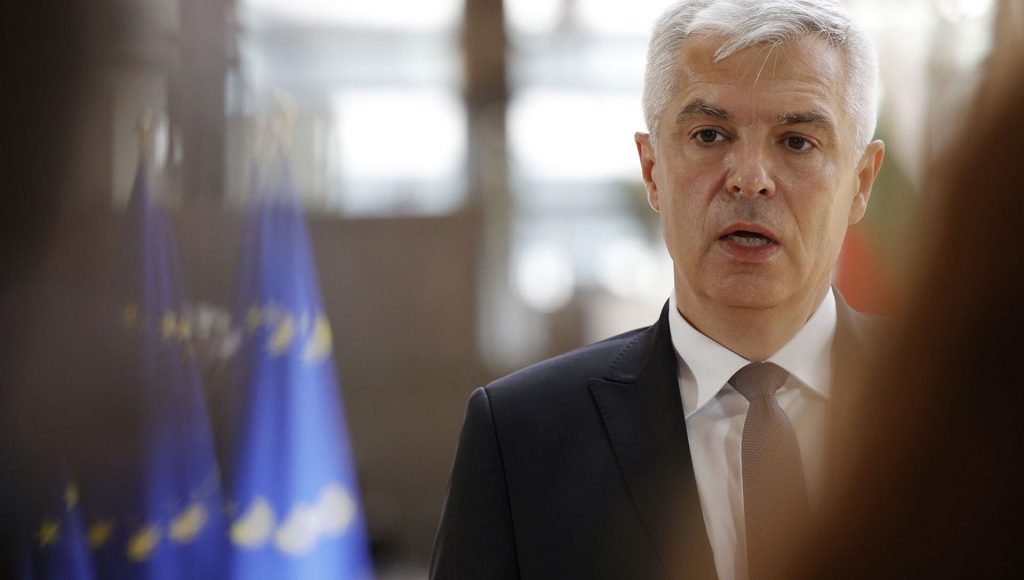
As a diplomat with many years of experience, he emphasised the country’s positioning in the world community in his program. Ivan Korczok’s foreign policy views are based on the country’s active role as a self-sufficient international entity. He proposes to build the country’s relations with foreign partners based on three principles of his foreign policy doctrine: “Neighborhood, alliances and partnership.” Ivan Korczok’s election program is based on three pillars: the rule of law, justice and modernisation. As Korczok notes: “I want to be a president who will help modernise the country so that we can overcome stagnation and decline. Education, healthcare, investment in infrastructure and restarting the economy are the challenges that unite Slovakia.”
The current Prime Minister of Slovakia, Robert Fico, supports Pellegrini but does not agree with Ivan Korczok. Comparing the two candidates, he pointed to the opponent’s commitment to American interests: “He (Pellegrini) is not an American servant like Mr Korczok; he is just a man with his own opinion who will try to unite while Mr Korczok will divide.”
The first sociological polls left practically no chance for Korczok to win even though, according to the results of the first round, the gap between the candidates was small – at 2% to 6% in favour of Pellegrini. The results of the second round demonstrated the total advantage of the speaker. However, closer to voting day, the situation began to change. The latest sociological study by MEDIAN SK, dated the end of February 2024, shows Korczok’s victory in the first round of 36% against Pellegrini’s 32%. However, as the study shows, in the second round, with a score of 51.7% versus 48.3%, Pellegrini still won.
In general, the current electoral processes and the clearly visible importance of the two candidates reflect modern sentiments among the Slovak public. According to Slovak experts, the population’s preferences were divided into conservative and more liberal parts, forming a specific background of internal political bipolarity.
Perhaps Pellegrini’s disadvantage is that he is trying to become part of the liberal electorate and Fico’s voters. And such “political splits” often disappoint both target audiences. Realising this, Fico made a move towards the pro-Russian niche. As Slovak media note, he met with the Russian Ambassador, where he criticised Western sanctions against Russia, then appealed to the Slovak Hockey Association to reconsider their position regarding players disqualified from participating in Russian KHL matches.
Whether these steps will help Pellegrini – time will tell, or the election result. Today, it is evident that both candidates are going to the second round. And then the chances of winning are 50 to 50. Everything will depend on how well the candidates can “reach out” to their voters and bring them to the polls. In a word, as in the parliamentary elections 2023, Slovakia again finds itself at a fork in the road: liberal and conservative. We will find out very soon which path Bratislava will choose.

